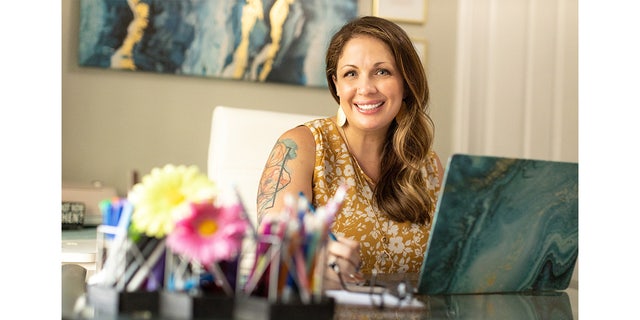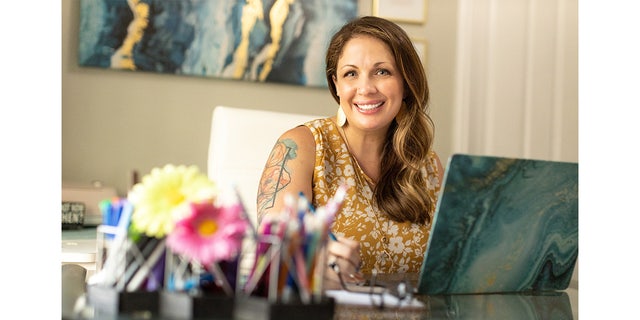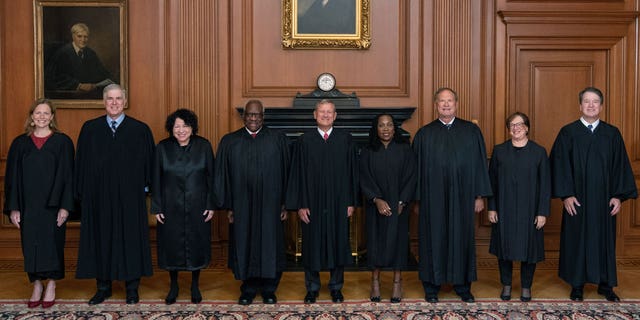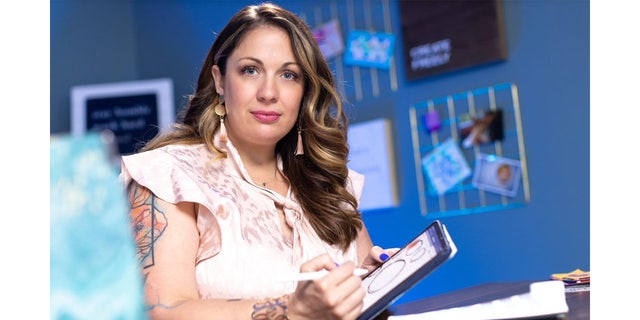
The Supreme Court heard oral arguments in a case involving a Colorado graphic designer who challenged a state anti-discrimination law because she wants to provide wedding website services, but not for same-sex marriages.
Finding the line between free speech and discrimination proved to be a difficult task, with justices putting forth a number of hypotheticals – some with clearer outcomes than others.
Lorie Smith, whose company 303 Creative LLC is suing Colorado, says that she has no problem working with customers in the LGBTQ community in general, but she refuses to create anything for a gay wedding because it goes against her religious beliefs.
Justice Amy Coney Barrett asked if Smith would publish a site that told the story of a couple who began their relationship as an extramarital affair.

Lorie Smith of 303 Creative (Alliance Defending Freedom) (Credit: ADF)
“I don’t believe she would,” her attorney Kristen Waggoner said.
Other hypotheticals were not so clear-cut.
Justice Ketanji Brown Jackson asked about a situation where a Christmas photo company was recreating old-time pictures and as a result they only allowed white children to participate because it accurately reflects the time period. As part of the hypothetical, the company served Black people for other types of photos and would refer them to other vendors if they desired. Jackson asked if this would be acceptable under Smith’s logic, because by forcing the photographer to take Black customers it would be changing their vision and forcing them to create something they do not want to create.
Waggoner did not appear to have an answer, but argued that she did not need to have an answer.
“That may be an edge case, but this is not,” she said, claiming that her client’s case is more clear-cut than that scenario.
Justice Elena Kagan challenged both sides with different hypotheticals. Questioning Waggoner, she put forth a situation where a man and a woman hire Smith to do their wedding website, and then a gay couple sees it and says they want the exact same thing. Kagan’s point was that it would not require Smith to create anything new.
Waggoner said this would still be a problem because the same words can have different meanings in the two contexts. Kagan challenged this by asking what speech Smith would be providing for the gay wedding, and Waggoner said her client believes same-sex weddings go against scripture and thus her words would be announcing a wedding she disagrees with.
When it was time for Colorado Solicitor General Eric Olson to present his argument, Kagan put forth another hypothetical situation that even she had trouble wrestling with.

Members of the Supreme Court (L-R) Associate Justices Amy Coney Barrett, Neil M. Gorsuch, Sonia Sotomayor, and Clarence Thomas, Chief Justice John G. Roberts, Jr., and Associate Justices Ketanji Brown Jackson, Samuel A. Alito, Jr., Elena Kagan, and Brett M. Kavanaugh pose in the Justices Conference Room prior to the formal investiture ceremony of Associate Justice Ketanji Brown Jackson September 30, 2022 in Washington, DC. President Joseph R. Biden, Jr., First Lady Dr. Jill Biden, Vice President Kamala Harris, and Second Gentleman Douglas Emhoff attended as guests of the Court. (Collection of the Supreme Court of the United States via Getty Images)
Olson was adamant that if Smith got her way it would be “a license to discriminate” that would let any business providing expressive services “to refuse services to certain customers because of their disability, sexual orientation, religion, or race.” Despite his position, he too appeared stymied when Kagan questioned him.
SUPREME COURT TO HEAR CASE ON BIG TECH’S LEGAL IMMUNITY FROM CONTROVERSIAL CONTENT
In Kagan’s hypothetical, there would be a gay couple saying they want a standard website, but with the addition of having on the homepage the phrase, “God blesses this union.” In the hypothetical, Smith would say she cannot do that, and the gay couple would argue that she would do the same for a straight couple.
“I think that is different,” Kagan said, pointing out that while most content on a wedding website is information given by the couple, having that phrase on the site could be seen as the opinion of a third party, specifically the designer who made the site.
“I have difficulty with that hypothetical,” Kagan said.
“It does get a little trickier,” Olson admitted. He went on to say that his position would not change in her hypothetical, but that it is “an edge case.”
Justice Neil Gorsuch also appeared to give Olson pause. He provided a hypothetical where a freelance writer would write press releases for anyone as long as they did not disagree with the messages on a religious level. When asked if Colorado’s law would compel that person to write whatever client wanted, Olson said no.
Gorsuch then pointed out that Smith says she would serve anyone, but not if the message went against her beliefs. When asked what the difference was between the hypothetical and the case before the Court, Olson brought up the relief Smith is seeking. Gorsuch dismissed that argument, as courts ultimately determine relief.
Another issue that was debated was what exactly constitutes speech. Justices Jackson, Barrett, and Sonia Sotomayor explored the technical aspects of web creation.
Jackson said the same website with the same content could be offered to gay and straight couples. Sotomayor argued that a website with details for a wedding is really the speech of the couple, not the web designer.

Lorie Smith, owner of 303 Creative at center of Supreme Court free-speech case. (ADF )
“Why is it your invitation?” she asked. “You’re not inviting them to the wedding.”
Waggoner countered that it is the same as a ghostwriter who does the actual writing even if someone else’s name is on it.
Sotomayor pressed the issue, pointing to wedding websites loaded with the couple’s photos and accounts of their personal stories.
“I don’t understand, how is it your story?” she asked. “It’s their story.”
Waggoner said that writers frequently tell other people’s stories, but it is still the writer’s speech.
Barrett asked if there would be an issue if there was a site that was “plug and play,” where Smith did the programming and coding in advance for a standard site, along with stock pictures preloaded, and she then sold the package to any customer who wanted. The justice asked if that would be protected speech.
Waggoner recognized that this would not be protected and would be different from creating new websites because the standard package would already be “in the stream of commerce.”
With that in mind, Barrett asked if it would be okay if a gay couple asked to use something Smith already did, without doing anything more. Waggoner noted that this would not happen because a gay couple would not want to use a site that had the names and pictures of a man and a woman.
CLICK HERE TO GET THE FOX NEWS APP
After the arguments had concluded, Smith said she always creates new material.
“My decision on what I create is custom and always based on the message, and never about the person requesting the message,” she said. “There are some messages I can’t create no matter who requests them,” said Smith after the arguments. “And Colorado is trying to force me to create custom, unique artwork to promote ideas inconsistent with my faith and the core of who I am.”
Fox News’ Shannon Bream and Bill Mears contributed to this report.






